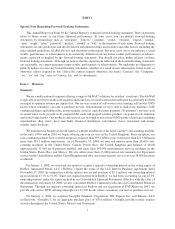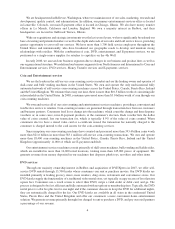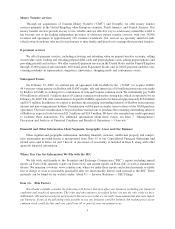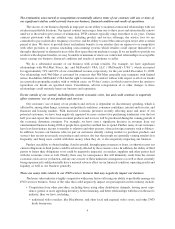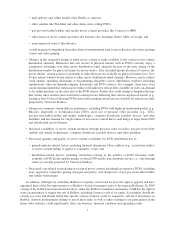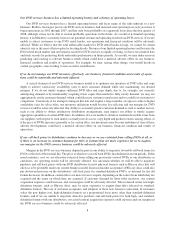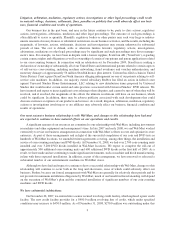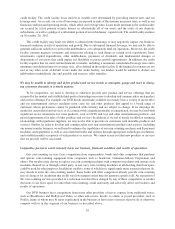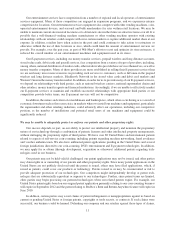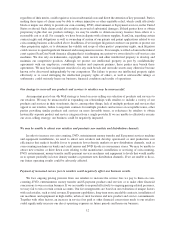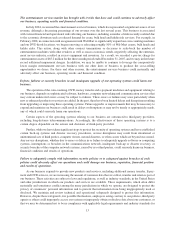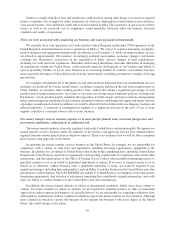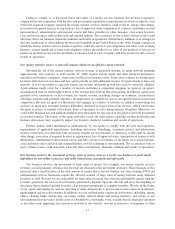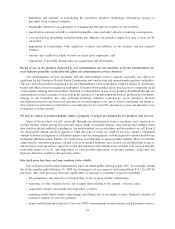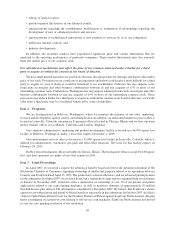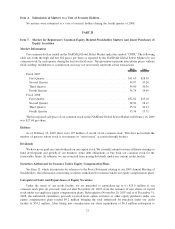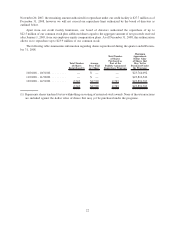Redbox 2008 Annual Report Download - page 14
Download and view the complete annual report
Please find page 14 of the 2008 Redbox annual report below. You can navigate through the pages in the report by either clicking on the pages listed below, or by using the keyword search tool below to find specific information within the annual report.regardless of their merits, could require us to incur substantial costs and divert the attention of key personnel. Parties
making these types of claims may be able to obtain injunctive or other equitable relief, which could effectively
block or impair our ability to provide our coin-counting, DVD, entertainment or E-payment services, in the United
States or abroad. Such claims could also result in an award of substantial damages. If third parties have or obtain
proprietary rights that our products infringe, we may be unable to obtain necessary licenses from others at a
reasonable cost or at all. For example, we have been in dispute with a former supplier, ScanCoin, regarding certain
contract rights and obligations as well as ownership of certain of our patents and patent applications related to our
coin-counting business as described above. In addition, if we instigate litigation to enforce our patents or protect our
other proprietary rights, or to determine the validity and scope of other parties’ proprietary rights, such litigation
could cause us to spend significant financial and management resources. For example, we filed a claim in the federal
court against ScanCoin North America alleging that it is infringing on a patent we own related to self-service coin
machines. We also rely on trademarks, copyrights, trade secrets and other intellectual property to develop and
maintain our competitive position. Although we protect our intellectual property in part by confidentiality
agreements with our employees, consultants, vendors and corporate partners, these parties may breach these
agreements. We may have inadequate remedies for any such breach and our trade secrets may otherwise become
known or be discovered independently by our competitors. The failure to protect our intellectual property rights
effectively or to avoid infringing the intellectual property rights of others, as well as unfavorable rulings or
settlements, could seriously harm our business, financial condition and results of operations.
Our strategy to cross-sell our products and services to retailers may be unsuccessful.
An important part of our 4th Wall strategy is based on cross-selling our selection of products and services to
our retailers. We may be unsuccessful in expanding our relationships with retailers to include a variety of our
products and services in their storefronts, due to, among other things, lack of multiple products and services that
appeal to our retailers, failure to negotiate contracts for multiple products and services on acceptable terms, other
parties providing similar products and services on more favorable terms, or reluctance by retailers to obtain
historically separate product and service categories from a single provider. If we are unable to effectively execute
our cross-selling strategy, our business could be negatively impacted.
We may be unable to attract new retailers and penetrate new markets and distribution channels.
In order to increase our coin-counting, DVD, entertainment money transfer and E-payment services machine
and equipment installations, we need to attract new retailers and develop operational or unit production cost
efficiencies that make it feasible for us to penetrate lower density markets or new distribution channels, such as
coin-counting machines in banks and credit unions and DVD kiosks in convenience stores. We may be unable to
attract new retailers or drive down costs relating to the manufacture, installation or servicing of coin-counting,
DVD, entertainment, money transfer and E-payment services machines and equipment to levels that would enable
us to operate profitably in lower density markets or penetrate new distribution channels. If we are unable to do so,
our future operating results could be adversely affected.
Payment of increased service fees to retailers could negatively affect our business results.
We face ongoing pricing pressure from our retailers to increase the service fees we pay to them on coin-
counting, DVD, entertainment, money transfer and E-payment products and services or to make other financial
concessions to win or retain business. If we are unable to respond effectively to ongoing pricing-related pressures,
we may fail to win or retain certain accounts. Our fee arrangements are based on our evaluation of unique factors
with each retailer, such as total revenue, E-payment capabilities, long-term non-cancelable contracts, installation of
our machines and equipment in high-traffic, urban or rural locations and new product and service commitments.
Together with other factors, an increase in service fees paid or other financial concessions made to our retailers
could significantly increase our direct operating expenses in future periods and harm our business.
12



